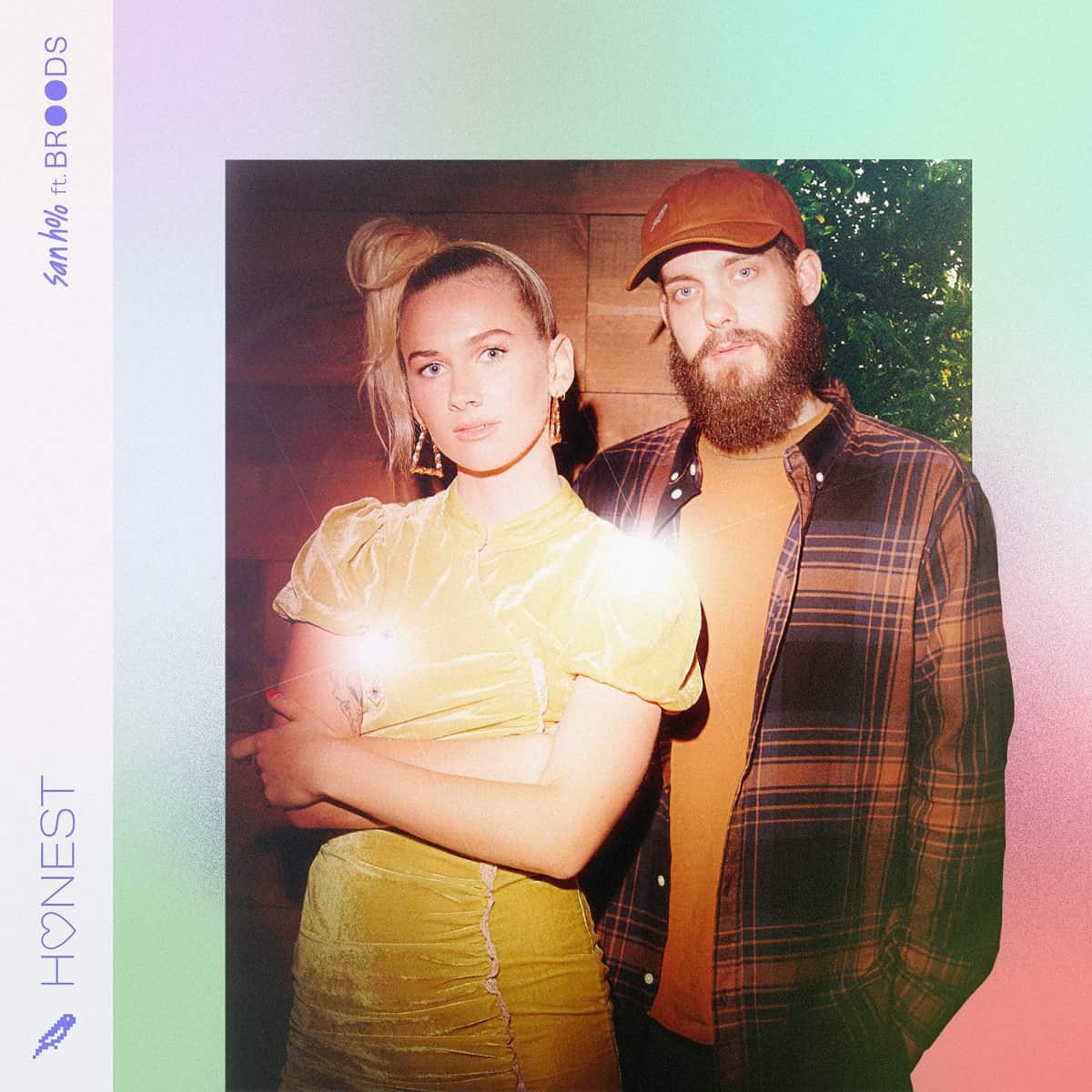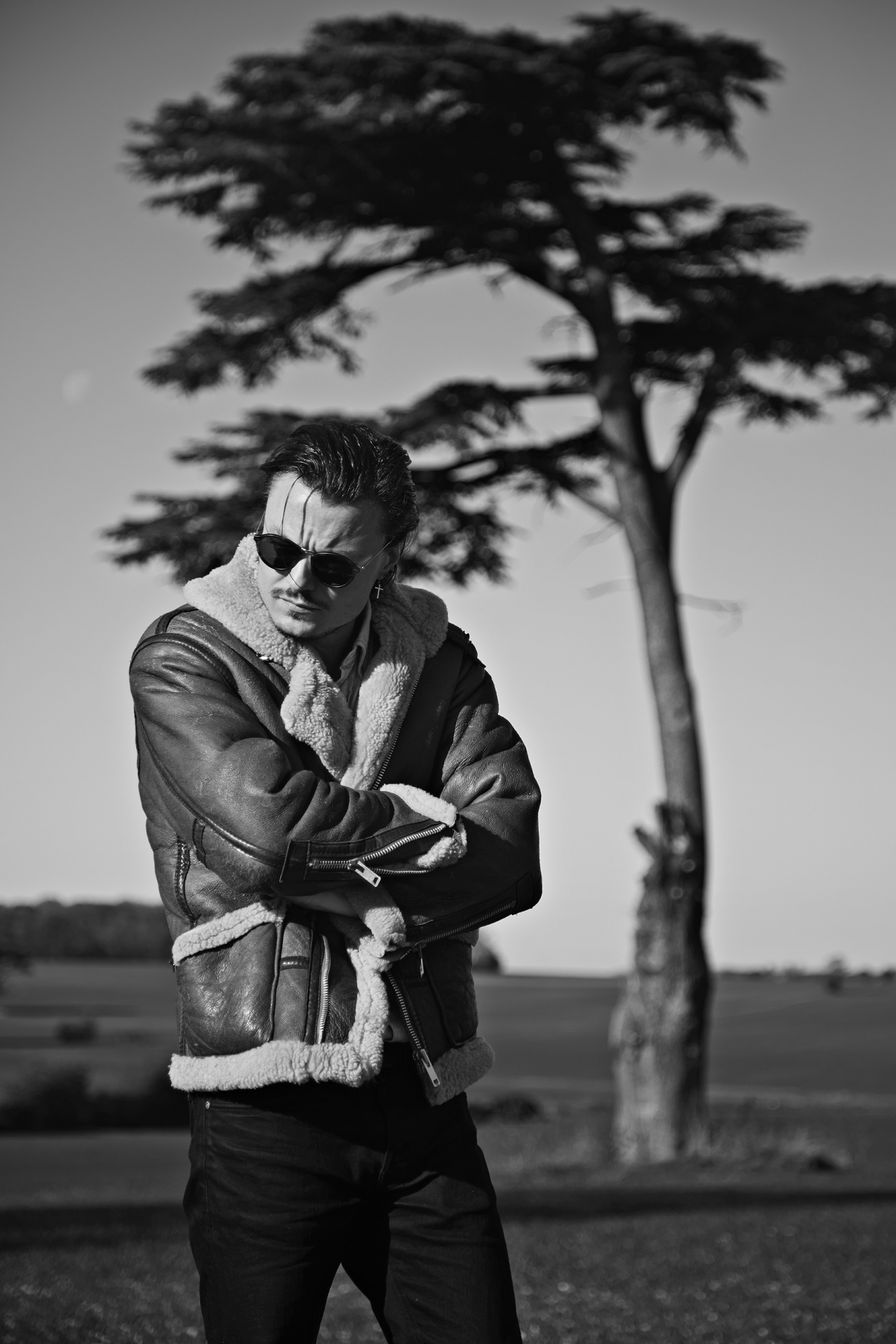Irish singer/songwriter CMAT opens up about her soul-stirring sophomore record ‘Crazymad, For Me’ – a beautifully bold, charmingly charismatic, and brutally honest breakup album that dwells in the depths of heartache and vulnerability.
for fans of Chappell Roan, Adele, Orla Gartland
Stream: “California” – CMAT
Ciara Mary-Alice Thompson is brutally, beautifully, and unapologetically exposed.
Six years after a massive breakup, the 27-year-old Irish singer/songwriter, who records under the name CMAT, is ready to talk – err, sing – about what went down, how it impacted her back then, and how it’s still impacting her now.
“I’m working on a wreckage with nothing there to salvage… I’m just taking photos for my book about the damage,” she sings brilliantly at the top her sophomore album, setting the scene for a soul-stirring record that boldly dwells in the depths of human experience, meticulously picking apart all-too relatable moments of heartache, trauma, sadness, and anger.
“Some have called me cheap, but it’s not that f**king deep,” CMAT declares, resolving to set the record straight in song: “I’m heading to California, don’t say I didn’t warn you. I’m milking what I can from this grief… I’m writing for the peace you wouldn’t leave.“
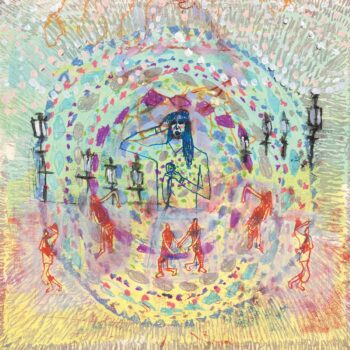
Whinging like a woman is
Hedging on what’s coming
‘Cause everybody likes me
When my pain is in a sonnet
And you have called me cheap
But you did this shit to me
Made me brilliant, you f**ked me up
And I’m reaping what you’ve sown
– “California,” CMAT
Released October 13, 2023 via AWAL, Crazymad, For Me isn’t so much CMAT’s revenge, as it is her cathartic, all-consuming eruption: An intoxicating, impassioned musical release channeling years’ worth of pent-up emotions and raw, physical tension and turmoil into one spellbinding, cinematic enterprise.
At once cheeky, charming, churning, and charged, the follow-up to 2022’s debut album If My Wife New I’d Be Dead – which entered the Irish Album Charts at number one, and earned CMAT the prestigious Choice Music Prize album of the year award – is a stripped-down, up-close and personal musical diary.
“You can heal from something and you can be doing absolutely fine and carrying on day to day, and then you’ll just remember one little detail and it will all come back,” CMAT tells Atwood Magazine.
“It’s a breakup album about a breakup that happened over six years ago, and that’s kind of the point of it – I wanted to make a breakup record with all of the time and perspective that you get after six years… and then as I was making it, I became more and more angry about all of the events that had transpired. It kind of renewed my anger and made me annoyed again, which is weird ’cause that’s not what’s supposed to happen. I think the whole point of the record is finding out that healing is not linear.”
I told you that my band started popping off
You told me that you played guitar
I knew that you had lied at the time you said it
But you could play my heart
It took a couple of weeks, you were shredding
Playin’ like a rock ‘n’ roll star
Holy, goddamn, you were so annoying
But you had my heart
Ooh, I guess I had to stay for something
Had to stay for something good
I guess I had to stay for something…
There’s a lot to unpack and even more to love about Crazymad, for Me, and we’re here for all of it – as is CMAT’s fast-growing audience.
She was recently nominated for “International Artist Of The Year” at the 2024 BRIT Awards, a status she shares with such globally renowned artists as Taylor Swift, SZA, Miley Cyrus, Lana Del Rey, Kylie Minogue, Olivia Rodrigo, and Caroline Polachek. It’s a testament to CMAT’s unparalleled, unflinching songwriting, her breathtaking vocal prowess, and her keen ear for melody that she can (and does) hold her own in such a densely populated crowd of musical talents. Yet she is the full package, and on her latest record, that truth shines.
Working together with Norwegian producer and artist Matias Tellez, CMAT turns a long-overdue breakup retrospective into a buoyant, brooding, and breathtaking (and utterly irresistible) spectacle: One whose charismatic vocal performances fill the world with life and uplifting energy, even as the artist herself processes some of her life’s darkest moments.
When she first began teasing the record in early 2023, CMAT described Crazymad, For Me as an “abstract break-up album” that involves time travel, Belle Epoque Paris, and a woman who may or may not be CMAT in the future. Poetry and colorful metaphor abound as her songwriting flourishes – references do include everything from The Little Mermaid to British colonialism, and at one point Jimi Hendrix’s name is dropped alongside Humphrey Bogart – but when we peel back the edges, what we ultimately hear is a bruised heart going through a long and arduous healing process, reflecting on and learning from her past, and just taking things one day at a time.
All of that is, of course, brought to life in a spirited, dazzling array of warm melodies, radiant harmonies, and achingly catchy choruses.
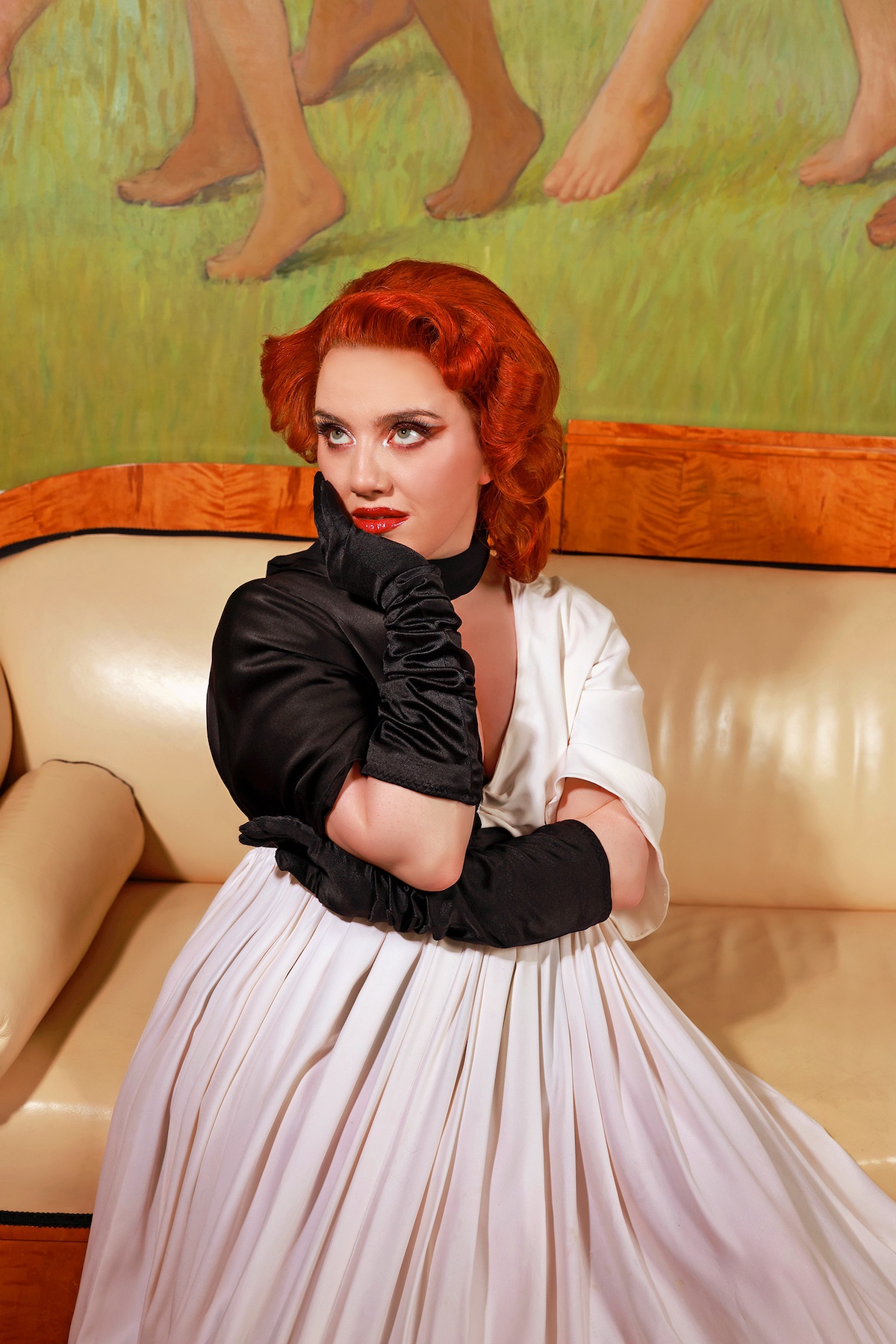
CMAT’s candor, humor, wit, and warmth make her music especially entertaining, but it’s the sheer vulnerability and raw humanity at each song’s core that make this music timeless.
“The whole point of a record like this is to get people to be able to see themselves in it,” the singer/songwriter concludes. Beyond just liking the music, she hopes people find a practical use for it in their everyday lives – whether that means posting a video of yourself screaming the lyrics on Instagram, or sitting quietly with these songs and letting their sentiment wash over you and through you (though CMAT would like more screaming videos, if you’re in the market for that such thing).
Atwood Magazine caught up with the remarkable artist days before her sophomore album’s release to discuss the wondrous music and intimate songwriting at the heart of this very special work. Dive into Crazymad, For Me in our interview below, and catch CMAT on tour throughout Europe and North America this February, March, and April! Find tickets and more information here.
She was a good girl, so I pay the price
I have to stay broken to be worth your nights
She left for better and you in a mess
So I’m just some stewardess
Who feeds your pets and does your dishes
And pays your rent
And helps you heal from something heaven sent
And I’ll get skinny, I’ll swallow hell
But if you turn me into her I might leave you as well
I’m the little mermaid, you split my legs open
I have her on a keyring, I keep her as a token
I bought it in Nyhavn in one of those little shops
I wish I never went there and I wish you would stop
– “Such a Miranda,” CMAT
— —
:: stream/purchase Crazymad, For Me here ::
:: connect with CMAT here ::
Stream: ‘Crazymad, For Me’ – CMAT
A CONVERSATION WITH CMAT

Atwood Magazine: How does it feel to be putting this record out into the world?
CMAT: Terrifying I would say, every single time I think about it. It’s scary ’cause it’s an album. It’s a little baby and it’s going out into the big bad world, and other people are there. But I’m excited as well ’cause I think it’s quite good. It’ll be nice for people to be nice about it, I hope. I don’t really care, but it’s scary.
This album arrives about a year and a half after your debut, If My Wife New I’d Be Dead. How has your relationship with that first record changed since its release?
CMAT: I think it’s gotten better. It’s funny because it is literally a year and a half ago that I released it, and I’m already, I’m quite nostalgic for it in a way, because making it was such a different experience to making this one. There’s definitely things that I would change about the first record, but I’m also quite nostalgic for the fact that I didn’t, and I wouldn’t have thought to change them at the time, which I think makes it good. There’s certain songs where I’m like, ‘Nah,’ and then there’s other songs where I’m like, ‘Wow, that’s so much better than anything I’ll ever do, ever again for the rest of my life.’
Did making a second album inform those feelings and change how you look at your past record?
CMAT: Yeah. There were definitely some things that with the first record made me change my approach to the second. The main difference I think was my vocals. Because before making the first record, I was not a live artist. I hadn’t done any shows or anything. I didn’t understand the difference between singing live and singing on the record. Once I started singing live, I was like, “Oh f**k, I should have been doing ‘this like this’ and ‘this like this.’” I should have been realistically trying to capture a lot of sound than trying to sing in a way that I thought was appropriate for a studio. Also I kind of just bashed through them and I didn’t know anything about a vocal warmup or vocal training or anything.
Then I was hit with a really harsh reality, almost this time last year, when I lost my voice for a month because I had done too much. So I had to do really intensive vocal training and physio and stuff before… Literally my voice came back about five days before I went to Norway to make the record, and then I was training my voice the entire time as well. I was doing Zoom calls with a vocal coach three times a week, and it was really, really intensive. It was a lot more intensive, that way, second time ‘round. And that was literally informed by the first record, I think. I love that first record, I think it’s amazing. But I definitely wanted something a bit more reduced as well the second time around. And I kind of honed in on what it is I do, which is lyrics. So I tried to prioritize all that the second time around I think.
Tell me what you mean by “reduced.”
CMAT: I think I was a very keen editor the second time around. I would fight with Matias Tellez, my producer, to take loads of stuff out, basically. And he’d be like, “No, what are you talking about? You’ve gotta leave it in. It’s great, It’s amazing.” And I’d be like, “No, it’s not amazing,” or “It’s not amazing enough to stay in. I think we can tell more of a story with less stuff.” So we were having a lot of, I don’t wanna say a lot of fights, but we were definitely, we were butting heads a lot over the course of the album making process, which is quite funny ’cause he’s very like, he is very headstrong about what he thinks is good, and also so am I. When that didn’t line up with each other, it would get pretty tense.

Good on you for standing up for what you believe in. Can you share a little about the story behind Crazymad, For Me?
CMAT: It’s just a breakup record. It’s a breakup album about a breakup that happened over six years ago, and that’s kind of the point of it – I wanted to make a breakup record with all of the time and perspective that you get after six years, and so initially there was this whole theme running through it. Initially it was gonna be a concept record, and then slowly but surely it became really straightforward, a straightforward telling of the story of something that happened six years ago. I think it brought a lot of clarity and when I went in I was like, “I’m going to use this record to be a bit like forgiveness and moving on and loving everyone,” like really positive. And then as I was making it, I became more and more angry about all of the events that had transpired. It kind of renewed my anger and made me annoyed again, which is weird ’cause that’s not what’s supposed to happen. I think the whole point of the record is finding out that healing is not linear. About time almost as a myth, time straightforwardly.
Are the emotions still as fresh on the record now as they were six years ago?
CMAT: Yeah, because I think the whole point is that you can heal from something and you can be doing absolutely fine and carrying on day to day, and then you’ll just remember one little detail and it will all come back and you’ll be so angry about something and you’ll be so annoyed about something. That was kind of what I was trying to capture, was the vision of someone who’s totally fine and totally moved on. But then it doesn’t matter because once it’s happened, it will kind of always stay with you and there’ll be like a five-minute burst every two months of me just being like, “F**k!” And that’s the point of the record.
You've also described this as an “abstract” breakup album. What does the actual name Crazymad, For Me mean to you?
CMAT: So “crazy mad for me” is a line from a Sheena Easton song, called “9 to 5 (Morning Train).” And that song, at the time that she would’ve sang it, she was like 19 and it was the early 1980s. And the whole premise of that song is that she’s a woman who’s just got married and she just sits at home all day waiting for her husband to come home because she loves him so much. And so she’ll while away the hours during the day doing housework and whatever because she’s waiting for him to come home ’cause she loves him so much. In the 1980s, this would’ve been seen as so lovely and so romantic. Now I would read it as a complete horror story and be like, ‘Wow, that’s terrible!’ That’s very haunting, and so I thought it was a good analogy for the whole record, because it’s two different reads on the exact same situation, and the only thing that’s changed is perspective and time away from it. I do love that song, though. I do unironically absolutely love that song. I think it’s one of the best ever.
Why did you choose “Whatever's Inconvenient” for the lead single?
CMAT: I quite pushed for it to be the lead single A, because I thought it was one of the best songs I’ve ever made. But B, because where it lands in the album and where it lands thematically is, if you’re looking at the album like it’s a story, then this is the middle. This song happened in the middle. All my favorite books have that structure of two, one, three, you know what I mean? You get the middle of the story first and then you get the beginning and then you skip forward to the end.
I really like “Whatever’s Inconvenient” for that because it meets me in the record right smack bang in the middle of all of the shit that’s gone on with that breakup and the fallout of it. And so that was why I wanted it to be the lead single – and also it bangs.
And then came “Have Fun!” which remains a personal favorite of mine, and that's the end of the record. I can see there being some resolution in this song, but I'd love to kind of hear your take on this track and understand what it means to you.
CMAT: Well, this song is a funny one because I had the lyrics for it for a very long time or I had quite a lot of the lyrics for it, especially the opening line. I think I actually wrote the opening line of that song last year when I was in Nashville. And then I spread it out and wrote it as a poem and I actually set it to an entirely other melody and an entirely other song. But then something very interesting had happened to me the day before I went in to write that song, which, not to go into detail, but I was having a fight with someone. Well no, I just had found out something about the person that the record is about in question. And then I had a writing session the next day, and the guy that I was working with was like, “What kind of song do you wanna make?” And I was like, “I really wanna make something like a Dottie West song.” And then he is like, “What do you want it to be about?” And I was like, “Just don’t even worry about it. You do the music and I’ll do the lyrics, man.”
So he was working out the music and I was just scribbling furiously. I wanted to make myself feel better about the resolution, but I still wanted it to be like, I’m still annoyed and I’m still angry about all this, but it’s working in my favor. I think that’s what the whole point of the song; it’s not about forgiveness and forgetting and moving on, but just kind of being like, all of this is working in my favor and not yours, and that makes me feel good. That’s kind of what the song is about, so it’s like, so go on, “Have Fun!” ‘cause I don’t care.
It's a phenomenal song and I think it does work where it is on the record. But in order to talk about the end, we should also talk about the beginning, “California.” Can you share a little bit about how you begin your album – where it starts, and why it opens with that song?
CMAT: Again, if we are to talk about the structure of a book or something, I feel like “California” is like the foreword from the author, before you actually get into the story of it. I specifically wrote that song for myself to give myself a pep talk into writing the rest of the album, and that’s it. So that song is really a song about making the album, which is I guess very meta and a bit confusing. But I just had this whole thing for ages where I didn’t really wanna make this record and I didn’t wanna write about this relationship and these people and all of this set of events, because I was really embarrassed by it. And I was really embarrassed that if I were to release music about this, then everyone who was there at the time would hear it and know that I’m still angry and upset about it, even after all this time. And how embarrassing that would be! So I didn’t make it for a while. I think that’s probably why it’s taken six years… And then “California” was the song that I wrote about that, essentially, and ended up becoming a really defiant pep talk into the rest of the record.
That’s why it had to come first ‘cause it is the foreword – this is what you’re getting yourself into and this is what the record’s gonna be about. Suck it up and deal with it.
You waste no time in immediately bursting out into this power ballad anthem moment: “California, don't say I didn't warn you.” There's passion, there's anger, there's heartbreak, and it's all right there from the start. To me it sets the tone for what we are going to experience.
Another favorite is “Where Are Your Kids Tonight” with John Grant – this song’s lyrics are really haunting. Of course, we can't discuss this one without talking about Robbie Williams’ response!
CMAT: Nothing like that has ever happened to me before in my life, and probably will never happen to me again. That was insane. I was weirdly in my label’s office, because I had to do some stuff on a laptop, so I’m working in an office, which is quite unusual for me. I was sitting on my laptop and I was basically just doing some admin e-work for all of the whatever boring pop star stuff that I had to do… I was sitting in a very quiet office typing away on my laptop, and this notification came up that was on a YouTube comment on a music video, which for whatever reason, they always come through my laptop.
And the comment was like, “I’m here from the Robbie Williams tweet.” And I was like, what? I was really confused, like, what are they talking about? What does that even mean? It didn’t occur to me. So then I went onto Robbie Williams’ Twitter page and there was the tweet, and I legitimately screamed.
Well this is majestic
— Robbie Williams (@robbiewilliams) July 13, 2023
I screamed and I almost fell out of my chair. Everyone was like, “What’s happening?” And I couldn’t really communicate verbally for a while. Then he started talking about me on a f***ing live stream. That’s when I really lost it, ’cause he was mentioning me by name and was like, “it’s my song of the year”… I was just like, that’s mental, that is mental ’cause he’s such a godlike figure in my life. We had posters of him up on my family sitting room when I was a kid, and my sister used to have a school bag that said “Mrs. Robbie Williams” on it. She went to him live eight times. I just know everything about him; to me it’s like he’s not a real person. So then when he started talking about me, I just felt like there was a glitch in the simulation or something, and clearly the whole world revolves around me, because there’s no way that this would happen otherwise. It was definitely terrifying. I still don’t even really know how to process that. Like, I can never meet him. I don’t want to meet him! I don’t think that will be cool.
Obviously we know what his favorite CMAT song is. What's your favorite Robbie Williams song?
CMAT: Such a difficult question because I have so many of them. “Road to Mandalay” is always one that pops up very early for me, like, “She’s Madonna,” “Strong,” “Feel” – there’s just so many, he has such a back catalogue of such amazing, amazing songs. My hot take on “Angel” is, I don’t think there’s ever been a better guitar solo recorded too. ‘Cause it’s so simple, but it’s so sad and everything about the song is perfect. It comes out of nowhere; it’s so good, and that’s an amazing song, but I don’t really consider that to be a “Robbie Williams song” because he didn’t write it. He doesn’t have any writing in it, and you can kind of tell because it doesn’t have any of the stuff that I love. Like, the quintessential Robbie Williams-isms, which I find very important… I write like him, I think, ’cause I drop a lot of pop culture references in and I’m very self-appreciating, and that’s his whole thing as well. Like “Strong” – “Early morning when I wake up, I look like Kiss but without the make-up, and that’s a good line to take it to the bridge,” that’s a bit me. All of that is just so deeply CMAT-coded. I just love him; I love him dearly. I think he’s a brilliant writer.
What was working with John Grant like?
CMAT: It was the best shit ever. ‘Cause I love him and I was obsessed with him from the age of 15 onwards. He is amazing. I didn’t meet him until the music video though, so he recorded his bit remotely in Reykjavík, and then I did mine in Norway. I didn’t actually physically get to meet him until the song was done and mastered and dusted, and we were making the music video for it. It was really awkward because there was loads of scenes where we had to stare in each other’s eyes and sing. He’s really shine and actually quite nervous, so I was trying to talk him down through it. I was like, “It’s okay. We just have to do this for 30 seconds and we never have to look at each other again.” And then it was really funny because he’s got a really good sense of humor. He’s really funny and he’s just so lovely. He’s just so nice, so smart, and so handsome, and speaks so many languages and is just as cool as I thought he was gonna be. He’s like the opposite of Paris Syndrome in a person. I was so worried that he wasn’t going to be as amazing as I thought he was going to be from the age of 15 onwards. So I was settling for him just being absolutely acceptable, and then I met him and he just blew everything out of the water. He’s the best.
I want to transition into discussing your own influences and inspirations. As a songwriter you've truly come into your own over the past couple of years. You're building your own style, and I love it: It's cheeky, but it's serious. There's this balance of pouring your heart out, but also recognizing that life goes on. I think it's very smart. Who are some of your early inspirations?
CMAT: Ooh, such a good question, actually. My influences are kind of all over the place, and I don’t really have any one person that I would be like, they taught me how to write a song, ’cause I’ve thought about this a lot. I don’t really know that many people where I studied them. I suppose the one person that I would have really, really studied intensely and was trying to figure out how they wrote a song was probably Gilbert O’Sullivan. He was definitely someone that I studied and got really intense about, because his first four or five records, there just isn’t a bad song, and it’s all so distinctly tuned into my kinda taste level both sonically and melodically, so I was really trying to figure out how he put stuff together.
So he’s one… Robbie, John Grant, I love Leonard Cohen, I love Kirsty MacColl, I love Kate Bush, I love Dolly Parton… There’s a pop star called Tinashe, who writes all her own stuff, whom I really, really love ’cause the way that she’s structured music as well, I find extremely satisfying, and I think that’s always the thing that I look for rather than someone who’s super tuned into every single corner of my personality and personal taste is what sounds extremely satisfying and who has the highest hit rate of satisfying sounding music for me, and Tinashe is probably one of the ones where she’s just always up there for me, and I’ve always referenced her in a lot of my writing because she’ll just do something… She’s just so instinctive, and she’s so brilliant at crafting something together, so I really do love Tinashe.
When you write songs, what are your guiding principles or guiding lights?
CMAT: It’s funny because I’m still always tuning them and then I’m making a decision on them and then I’m changing my mind with them – and then sometimes, I go back, but I think the most important one that has left some really good stuff has always been, you need like a Serato starter or you need an automatic piece of writing to get your foot in the door of what’s eventually going to be a good song. What I mean by that is, I don’t believe in writing a song every day. I don’t really believe in writing songs every day. I don’t think it works. I don’t believe in sitting down at a desk and being like, “Okay, today we’re going to write a song and it’s going to be really good and it’s going to be about this, this, this.” That doesn’t really work. I think you need to be occupied and doing something else. And then all of a sudden I’ll find myself randomly singing something or thinking something or have some kind of idea in my head. And I’ll try and capture that because generally a lyric and a melody will come together at the same time. I did that even when I was a kid. And I’ll capture that and then I’ll sit down and have this bit of this song.
I need to work it out, from that point outwards. And need to make sure that no matter how strong my idea is, I have to always sacrifice that idea. If it doesn’t sound good, if I’m singing it and it doesn’t sound, if it’s not rolling off the tongue and it’s not completely blown with the melody, then it has to go in the bin. Even if it’s the smartest song idea I’ve ever had, ever, and it’s genius – I’m very profound [laughs] – you have to bin it, you just have to bin it. It doesn’t sound good. So those are my two big – ones is, it needs to come from a very genuine place of self-expression, like the initial idea. Not everything is gonna be written f**king “Cowboy” – I wrote “Cowboy” in like 20 minutes or something – but the interesting thing about that is, you can’t just wait for them to come around.
You have to constantly be working and constantly be flexing the muscles in order for something like that to eventually come to you. So yeah, I think you have to start from a very genuine place of self-expression instead of, and I’ve done this as well, I’ve done this and then I’ve failed at it, and then I’ve kind of understood why I failed. If you go into a writing session for example and you’re like, “I would really like to write a song about X because I think it would be a really good idea,” that’s not a good idea. That’s not actually what you wanna write about. You wanna write about the thing that’s actually in there, the thing that isn’t that smash or isn’t that profound or isn’t that clever! You can have a good idea for a song, but if it’s not genuine and it’s not from an actual genuine place of, this is something that I have going on that I need to get off my chest, then it doesn’t work.
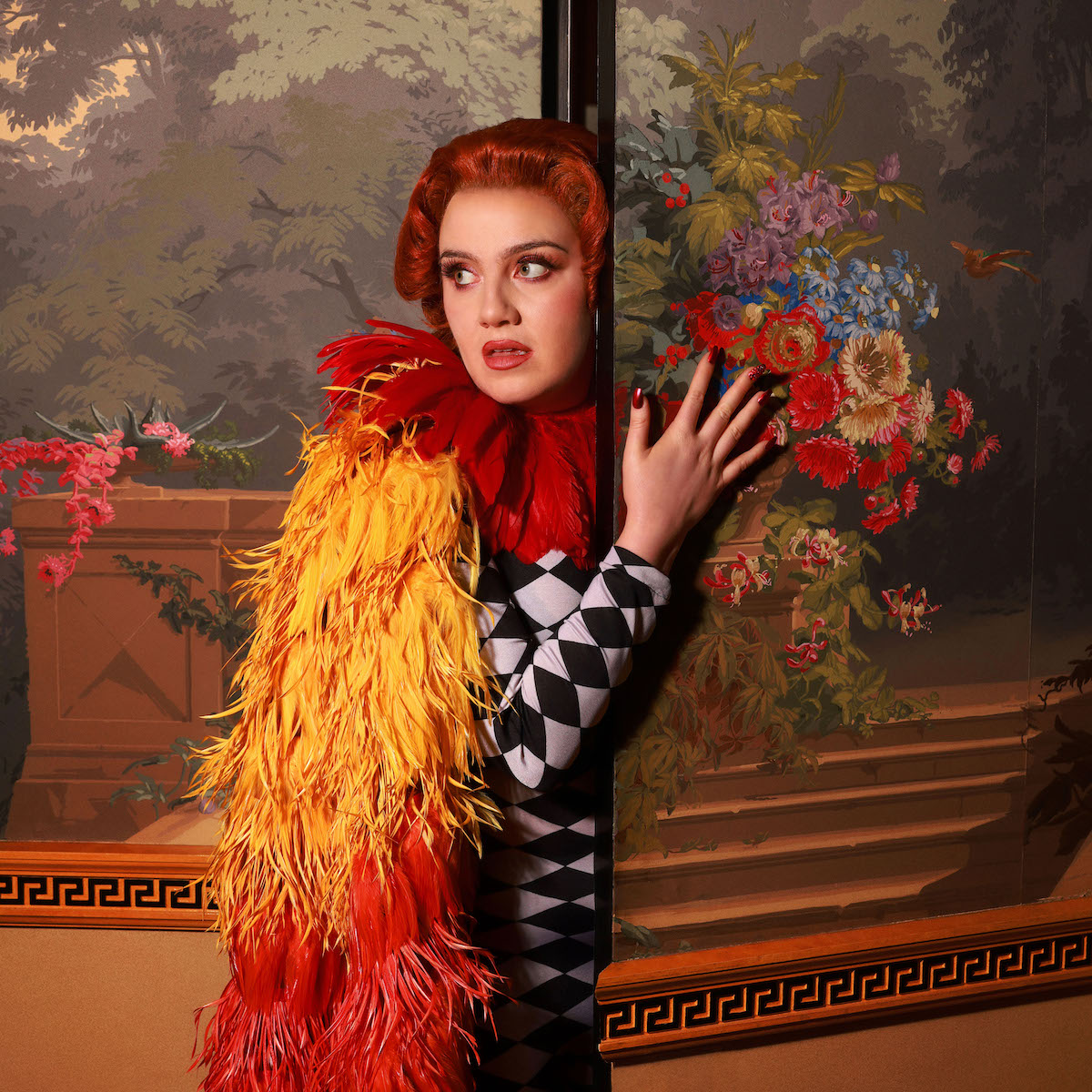
It sounds like for you it's part impulse, part very concentrated and deliberate.
CMAT: I think Carole King says that every really good song is about 10% inspiration and then 90% perspiration. And I think she’s right, because if it’s all perspiration, it doesn’t work, but also if it’s all inspiration, if you’re just going with your first idea for everything, it can get really lost. You have to learn to edit yourself. I think about this shit more than almost anyone I’ve ever met. I need to meet Carole, probably, to really have it out with her.
Does this album rely on both of those things?
CMAT: In a way, songs and songwriting is the same as the way that emotions transpired – like, I’m gonna use an example here, and it’s probably a little bit negative, but I do love her: Kacey Musgraves made a divorce record less than a year after she got divorced. And I found it wasn’t very good; I didn’t really like that record, but I really love her. I think she’s brilliant and I think that she’s a brilliant, brilliant songwriter. And you can hear her brilliance in the record, but because she wasn’t far enough away from the divorce at the time that the album came out, she didn’t really have a lot to say about it that was very profound or very sat on. I felt like the problem with that record wasn’t her talent or her skills or her taste or anything. It was just that she was working from a place of shock and anger and disappointment instead of just sitting on it all a little bit longer to have a little bit more to say about it. I think she just put that record out too fast, basically. And I think that’s a really good analogy for emotions in general. If something happens to you, you’re not actually gonna have any perspective on it or be able to say anything interesting about it until a significant amount of time has passed.
That's a really interesting perspective; instead of striking while the iron is super fresh, give it time for the emotions to really build and for you to live your life a little bit, and then see how you feel about it.
CMAT: Similarly, I don’t wanna hear a single f***ing COVID record for at least another five years. Do you know what I mean? I don’t want a single piece of art or anything about COVID for at least another five years. You can’t strike while the iron is hot on emotions and feelings. And this is the thing, that kind of thing works when you don’t realize that it’s significant. I’m trying to think of an example of one of my own songs, like, “2 Wrecked 2 Care” on my first record. I remember writing that really quickly because I just had an idea to write a song about being tired because I was extremely tired. I didn’t think it was significant or a special song or anything; I was just writing it ’cause I was doing it automatically, and it was a thing that was fresh in my mind, but I didn’t have a big idea about it. Whereas I think when something big happens, like a divorce or a global pandemic or a breakup or anything like that, you know it’s significant. And so you’re dealing with a very weighty topic. The impulse is to go in and be really overwrought about it or really bitter or something like that. And it just it doesn’t work. With the small things, you have to make them bigger. With the big things, you have to make them smaller. With a divorce record, I don’t wanna hear about how sad you are that you’ve gotten divorced. I wanna hear about a very specific, small, minor detail of something that you didn’t realize was going to change, but that has now changed. And I want that to be the window into the sadness as opposed to just being like, “I’m sad.” That’s what writing is for, I think.
What would Taylor Swift really think about Harry Styles or John Mayer if we heard her writing and singing about them today?
CMAT: Taylor’s great, Taylor’s amazing. She’s hot and cold. She’s not always amazing, but I do think she’s written some of the best songs ever. She’s just so prolific. She writes so much all of the time, constantly. And she’s in on top of everything all the time. Her song about Harry Styles is one of my favorite songs that she’s done, and the song about Jake Gyllenhaal is obviously just one of the best songs ever written ever. That’s an example of the top of her game – and I think that took her a while to write as well, ‘cause she dated him when she was 19. That Red record came out when she was like 22, because the song “22” was on it. Now she made it 10 minutes long, 11 or 12 years after the break event. And that’s when she’s really, really good. She f**king gets it… I love her.
Every really good song is about 10% inspiration and then 90% perspiration… You have to learn to edit yourself. I think about this shit more than almost anyone I’ve ever met.
As I mentioned earlier, I have too many favorite moments to count on this album – from “Where Are Your Kids Tonight” – “A heartbeat, I used to have one of them too. Now I find I've picked up problems from loves of mine who swear they ain't got them. Everything fun falls apart and leaves me here,” to more sassy, but also really intense lines, like, “And I'll get skinny and swallow hell, but if you turn me into her, I might leave you as well” from “Such a Miranda.” Your lyrics resonate, and I'm curious, do you have any favorite lines that continue to resonate with you?
CMAT: No. Is that a bad thing? I don’t really think about specific lines in that way because I think patting myself on the back for my own work is never, in a very specific, minute way, doesn’t really work and make me good. I’d be very self-critical. know that other people like that stuff and I’m proud of that. In general, I like to look at the overall picture and be like, that’s a f**king banger. Like with “California” –I think probably all my favorite lyrics are on “California.” But what’s funny about that is “California” has always been my favorite song off the record. Anyone who doesn’t do music prefers “Stay For Something” or any of that stuff that’s more immediate and more intense and impulsive, whereas I worked really hard on “California” and it took me a while to get all that together and get it right. I probably got through four versions of that song; it’s very cooked.
So I’m really proud of that song and I think it’s great. But I’m also critical of the fact that I think it’s great, but it’s not everyone else’s favorite CMAT song. So I need to figure out what it is that other people like – so there’s not really any specific lines where I’m like, “Wow, I did such a good job,” because there’s always a feeling in the back of my head where I’m like, “Yeah, but then you did this and you did this.” It’s very hard for me to congratulate myself. In “California” I have a line that’s like, “Now I trade an English deer and my nanny’s, nanny’s, nanny’s fears are living here along with all of yours.” I liked fitting in something about British colonialism into a lyric about writing a breakup song. I actually just liked that for my own personal entertainment; I don’t really think that’s the best lyric on the record, but I find it entertaining. So that’s why I liked that one. And then I’m trying to think… “Such a Miranda,” I’m quite proud of that one because it is literally just a straight-up telling of a story. I think I did quite a good job, and especially the thing about the little mermaid and using the original story of the little mermaid to talk about a relationship with an older person when you’re a young teenager and stuff; I think that was good. It’s like hard to… I’m a genius. [laughs]
Do you still listen to your music once it's out? Do you go back to your own art, or do you listen to others?
CMAT: Yeah, I do. [laughs] It’s so embarrassing. I definitely do. I listened to my first record a couple of months ago I was on a train somewhere and I was on Spotify… I go through phases of being able to listen to music and not being able to listen to music. At the moment I’m not listening to music at all. I’ve no interest in it, because I’m doing the album and I have to talk about that all the time and I’m always in the company of other people. So it doesn’t really accommodate me, actually going intensely in on records and stuff. I also get really hyper fixated on things, so like the whole first half of the year was entirely dedicated to the music of Leonard Cohen, because I somehow had never listened to him before last year, and it’s that kind of thing where I just discovered him for the first time, and I was going around talking to people as if they’d never heard of him. [laughs]
I was like, “Have you ever seen Leonard Cohen? He’s really good.” And everyone’s like, “Yeah, of course we f***ing have. Like, he’s the most famous person on the planet.” And I’d be mansplaining Leonard Cohen to people everywhere I went, ’cause I was discovering him for the first time, and I was like, “This guy’s a genius.” Everyone’s like, “Yeah, we know. There’s paintings of him on buildings in Canada everywhere you go. Of course we know about Leonard Cohen.”
It’s me being like, have you heard like Bob Dylan. [laughs] I do that all the time as well. There’s so many blind spots for my early youth where I didn’t get exposed to music like that really – the good shit. Finding it as an adult is very exciting, but after the Leonard Cohen season, which is about four months long of me literally physically not being able to listen to anything other than him, I just struggled to listen to anything else, ’cause it’s just not as good.
Which is terrible, ’cause you can’t really compare it that way. But nothing is as good as him. So I don’t know what to listen to anymore. I went back to my record, ’cause I then was trying to compare and contrast or something. I don’t know what I was doing, but I listened to my first record a lot a couple of months ago. Having gone through the second album process of being critical of my first body of work and using that as a jumping off point for the second, after the second record was done, I went back to my first record and I was like, “Actually this shit bangs. This record is so good. I really killed it.” So yeah, I do all the time. [laughs]
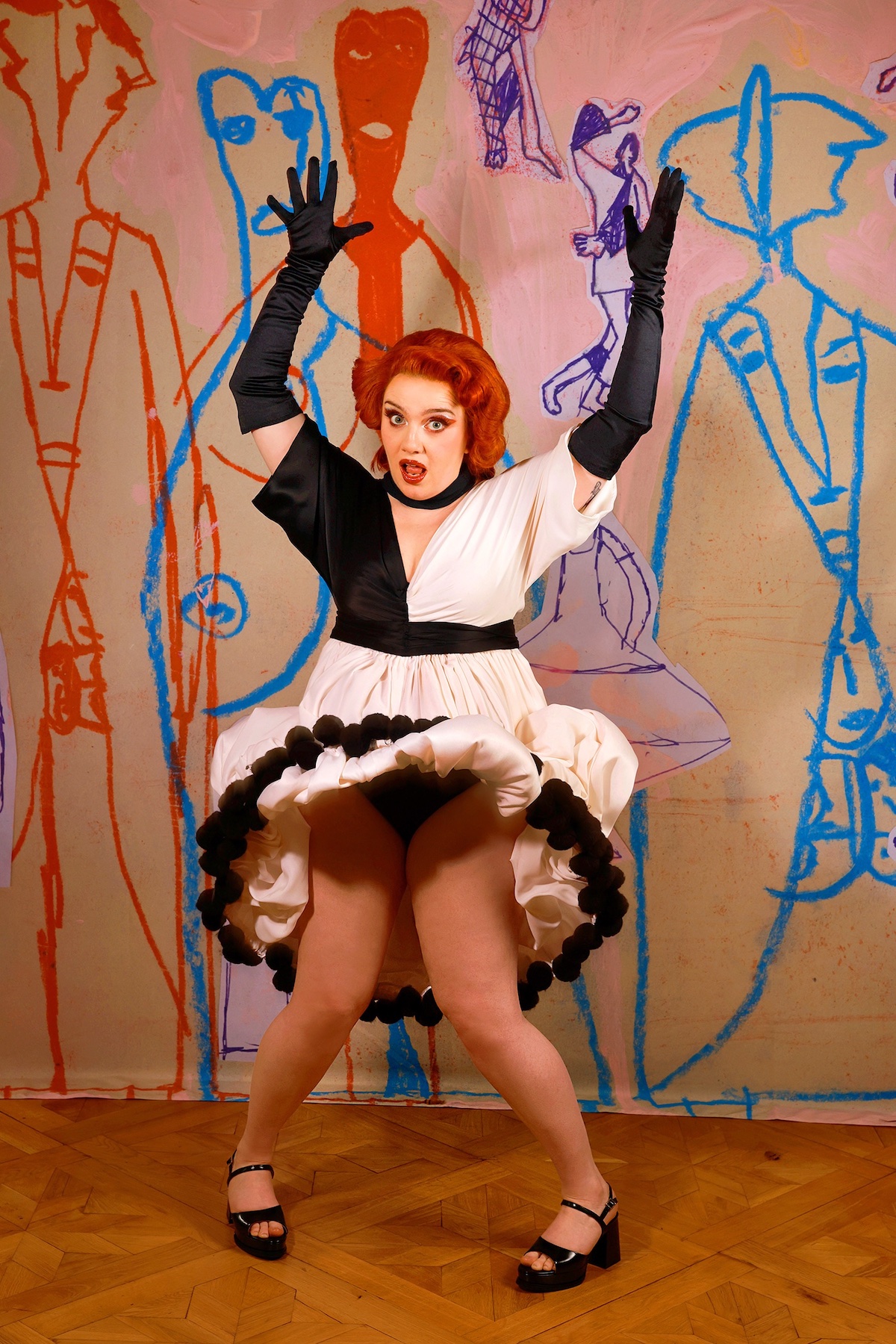
What do you hope others take away from Crazymad, For Me, and what have you taken from creating it and now putting it out into the world?
CMAT: The only thing I can hope other people take from Crazymad, For Me is that they enjoy it. That it’s an enjoyable listening experience. That would be the first thing is like, when you listen to a new record for the first time and you’re like, yeah. And not that it’d be hyper intellectualized or anything, but just that you’re sitting there like, yeah, this f**king bangs.
That’d be the first thing I hope. The second thing I hope is that women specifically are able to use it in a way of comforting their own anger or something. This girl the other day on Instagram posted a video of herself in her bedroom singing along to “Whatever’s Inconvenient.” And she like screaming it, and she was clearly just by herself in the house. And she was acting out the lyrics in an interpretive dance style, but also in a very angry way. I think the caption was something along the lines of like, “I’m two weeks out of a breakup.” I hope shit like that happens more. I’d like a little bit more of that, ’cause I personally find it very entertaining – and it’s also what it’s there for, right? The whole point of a record like this is to get people to be able to see themselves in it. That’s really all I hope for, is that people enjoy it and that people find a practical use for it in their everyday life. And that it helps them make sense of stuff.
In the spirit of paying it forward, who are you listening to these days that you would recommend to our readers?
CMAT: I’m not listening to music at the moment. I’m really, really not. I’ve been listening to every Nora Ephron audiobook that exists, and also I’ve just tucked into Douglas Stuart, he wrote a book called Shuggie Bain. He is absolutely amazing. Because I travel so much, I’m not really able to read ’cause I get motion sickness, so I’m listening to his latest book. I read Shuggie Bain and it ruined my life. It ruined me. It’s the saddest thing I’ve ever read in my life; it’s absolutely amazing. And so now I’m onto his second novel, Young Mungo, which is also like gay horror – people in Glasgow in the 1980s. It had all of my favorite things basically, and it’s incredible. So I’m listening to that.
I guess in terms of musicians I’d want people to listen to, probably an obvious one, but my ultimate guy is Junior Brother from Ireland, who I love so deeply, who I have a Christmas song with. He released an EP called Junior Brother’s Favorite, which is just one song that’s 19 minutes long and it’s the best thing you’ll ever hear in your life. It’s crazy. It’s so him. It’s really like an audio manifestation of his brain and all of his influences and interests, ‘cause he’s such an interesting guy. He’s just a normal straight bloke from county Kerry, except he’s not, because he spent all of his time alone as a kid because he just wanted to listen to Joanna Newsom.
When I met him, I was working in a Super Value and he was working in a Tesco and we were both writing insanely dense folk music, and we were in Dublin and we both thought we were the smartest people in the world. That’s kind of still the case, I guess, but he’s gone really left field. He’s gone extremely dense. He’s going further and further down the rabbit hole of his own specific niche interests, and that includes the medieval history of Ireland.
I just think he’s the best artist; everyone else I know gets a lot of acclaim, there’s very few people that I could recommend to you who are not more famous than me ’cause I’m kind of at the bottom of the barrel of the people I know. But he’s someone who I just think doesn’t get enough credit for how much of a genius he is. He truly, truly is.
— —
:: stream/purchase Crazymad, For Me here ::
:: connect with CMAT here ::
— — — —

Connect to CMAT on
Facebook, Twitter, TikTok, Instagram
Discover new music on Atwood Magazine
© Sarah Doyle
:: Stream CMAT ::

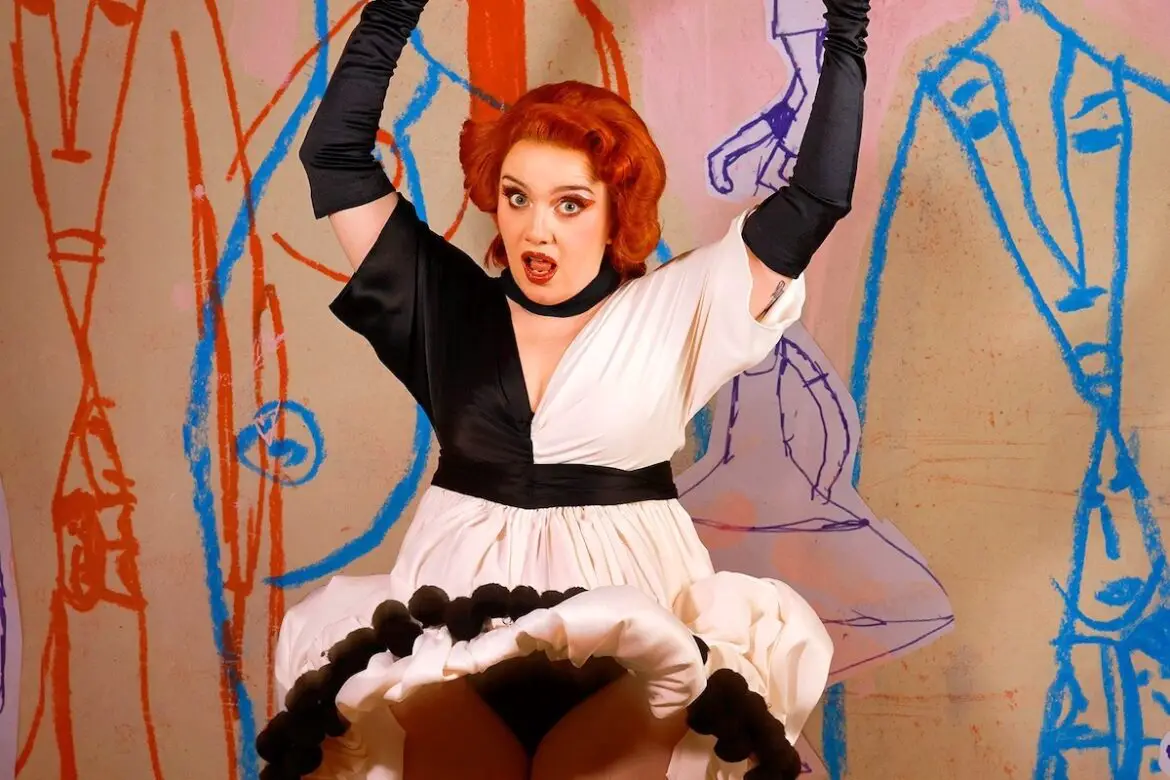
 © Sarah Doyle
© Sarah Doyle

